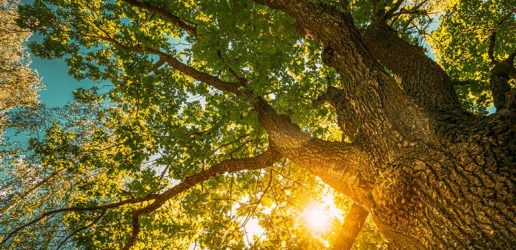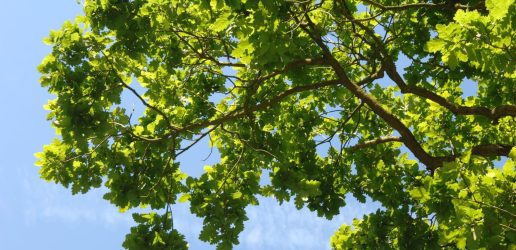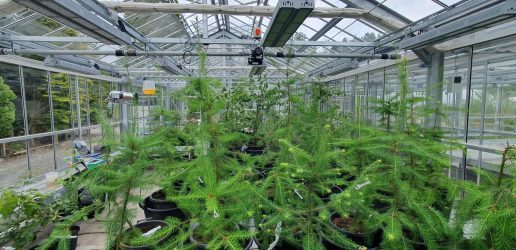
Earlier this month UK Research and Innovation (UKRI) announced the successful Future of UK Treescapes programme research bids and Forest Research has secured participation in three of the funded projects.
Six research teams across the UK will receive a share of £10.5 million funding from UKRI to develop new tools and approaches which will help trees and woodlands adapt to climate change and enable the UK to reach net zero greenhouse gas emissions. The research will also improve understanding of the value of trees to people and the planet, and support the expansion of treescapes across the UK.
Involving multi-disciplinary teams from thirteen universities and research institutes, over 40 non-academic partners and supporters, and with funding for three years, this funding forms part of the £14.5 million Future of UK Treescapes Programme.
Forest Research has secured participation in the following projects:
- Connected treescapes: a portfolio approach for delivering multiple public benefits from UK treescapes in the rural-urban continuum, led by Professor Piran White and Dr Julia Touza from the University of York. This project will evaluate how treescape form and function affects public benefits. Focusing on five community forests, it will address the role of landscape-level partnerships in delivering public benefits from UK treescapes.
- Branching Out: New Routes to Valuing Urban Treescapes, led by Professor Michael Wilson from Loughborough University. This project will focus on urban treescapes to respond to the increased tree planting targets of local authorities, recognising the need for them to achieve multiple public benefits alongside carbon sequestration, including health and wellbeing, green infrastructure, social amenity and the green economy outcomes.
- Learning to adapt to an uncertain future: linking genes, trees, people and processes for more resilient treescapes (newLEAF), led by Dr Stephen Cavers from the UK Centre for Ecology & Hydrology. This project takes an interdisciplinary approach to answering how quickly tree species can genetically adapt to change in the wild, whether human intervention is needed to accelerate adaptation in tree populations, and how best to intervene if so.
The other projects funded by Treescapes are:
- Voices of the future: Collaborating with children and young people to re-imagine Treescapes. Led by Professor Kate Pahl from Manchester Metropolitan University. This project brings together a set of partnerships with local, regional and national organisations including early years’ contexts, primary and secondary schools, Natural England and the Community Forests to explore how young people perceive and connect with treescapes.
- MEMBRA: Understanding Memory of UK Treescapes for Better Resilience and Adaptation. Led by Dr Estrella Luna-Diez from the University of Birmingham. This project will study how trees can adapt to stress alongside using the concept of memory to integrate a sciences-and-humanities perspective on how best to enhance the resilience of UK Treescapes.
- Creative Adaptive Solutions for Treescapes Of Rivers (CASTOR). Led by Dr Matthew Dennis from the University of Manchester. This project will identify unique opportunities through which riparian woodland (along rivers and waterways) can promote and protect natural and cultural heritage, deliver nature recovery through wilder, better connected landscapes, and build climate resilience.
Forest Research Chief Scientist, Professor Chris Quine said:
“We’re delighted to be involved in several of these projects and are grateful to the funders for enabling us to actively participate in these stimulating research collaborations. Spanning topics covering urban trees, community woodland partnerships, and the genetics of tree populations they will enable Forest Research to apply its wide-ranging expertise in support of resilient treescapes.”
Recent News
View All news
Woodland managers are invited to take part in a new project to protect the nation’s oaks
Join a webinar and in-person workshop to learn about monitoring and protecting oak trees.

Webinar: Observing and understanding oak health across the UK
An online webinar launching a new, practical oak-health monitoring system for woodland managers and volunteers across the UK.

Webinar: Understanding drought risk for UK woodland creation and forestry
Hear about new research on how rising drought risk is reshaping UK forestry and the tools being developed to support climate‑smart woodland creation.

Woodland managers are invited to take part in a new project to protect the nation’s oaks
Join a webinar and in-person workshop to learn about monitoring and protecting oak trees.

Webinar: Observing and understanding oak health across the UK
An online webinar launching a new, practical oak-health monitoring system for woodland managers and volunteers across the UK.

Webinar: Understanding drought risk for UK woodland creation and forestry
Hear about new research on how rising drought risk is reshaping UK forestry and the tools being developed to support climate‑smart woodland creation.
